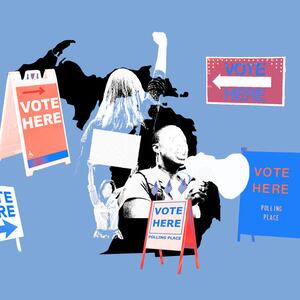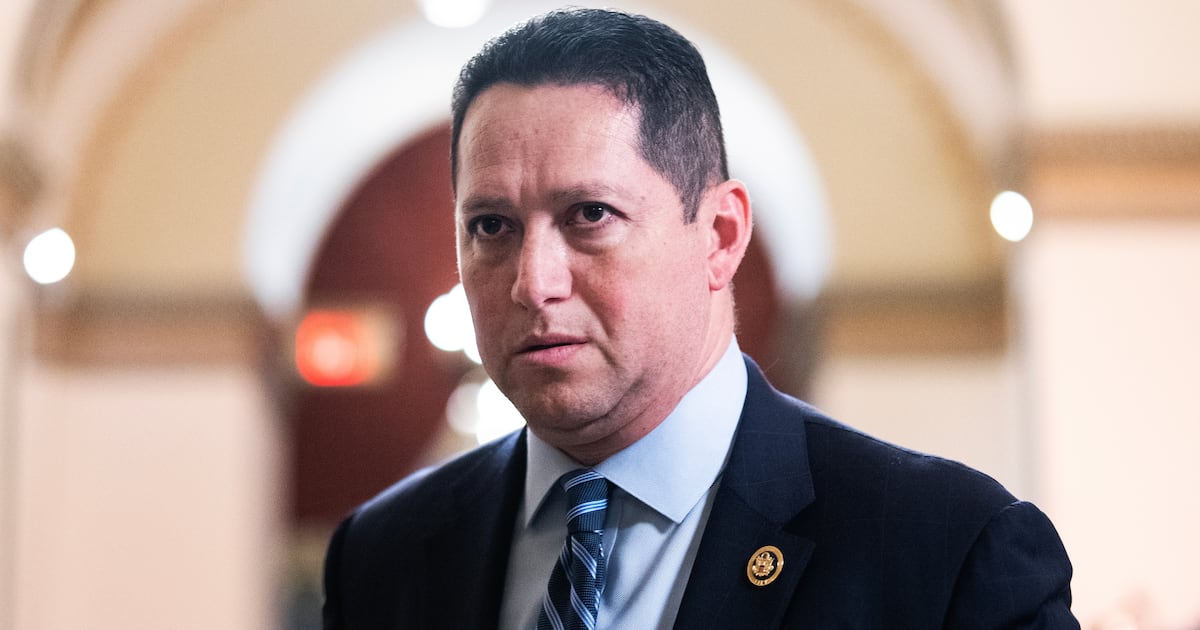ROCHESTER, Michigan— Huddled together on a brisk October morning in front of an ornate pond fountain, a trio of Michigan state senators were almost indistinguishable from the canvassers bundled up to join them.
“What is the thing we can do to give them a reason to vote?” asked state Sen. Jeff Irwin, an Ann Arbor Democrat wearing a Red Wings pom-pom hat and a flannel jacket. “The abortion issue, what that does, is that gives a whole lot of those folks just a really obvious reason to show up.”
These two-car garage lined streets in Oakland County are the front lines for Democrats hoping the “shockwave” of the Supreme Court’s Dobbs v. Jackson decision, as state Sen. Mallory McMorrow described it, will overcome the countervailing force of inflation in a midterms cycle where just about all other historical indicators favor Republicans.
Yet Michigan Democrats are optimistic they can ride the coattails of an abortion rights ballot referendum not just to pick up some state and congressional seats here or there, but also to retake the state Senate majority for the first time since 1984.
Locking in sporadic voters in these towns that voted for Donald Trump in 2016 and Joe Biden in 2020 could make all the difference; a consistent pattern of around 5,000 additional votes between the two cycles made places like Rochester Hills, Novi, and Auburn Hills flip from red to blue.
The way to do that, these local Democrats believe, is to tie the meaning of the vote not just to the national party, but to Proposition 3, the referendum deciding whether to protect or ban abortion.
A recent Detroit Free Press poll found Prop 3 had 64 percent support among likely voters, with 59 percent saying they would vote yes on the measure if the election were held when the poll was in the field from Sept. 15 to 19. Michigan voters can already start voting after receiving an absentee ballot.
One of those door-knockers on a crisp Saturday was Gabriellla Sullen, a 30-year-old Detroit native driving a revived white Ford Bronco and sporting a “Bans Off Our Bodies” beanie with a “My Body My Choice” sweater.
She started off the morning one for five, passing houses bare of any yard signs, with the exception of one for Republican House candidate John James, who’s nearing perennial candidate status after a pair of failed Senate bids in 2018 and 2020.
Passing another house with an electric Ford Mustang and a Jeep Wrangler, Sullen, who left the IT industry to join Planned Parenthood as an organizer, said “most of the people in my social circle” consider abortion to be their top issue this cycle.
“Yes on Prop 3, got it,” a voter who only wanted to go by her first name, Adrenne, said as Sullen made a lightspeed pitch while handing out a pamphlet.
For state Rep. Padma Kuppa, a Democrat running for state senate who currently represents the Detroit suburbs of Troy and Clawson, the abortion debate has been much different among the immigrant communities in her district.
“There are also people who are immigrants of different religious backgrounds who may not have the same understanding of the abortion bans in this country,” Kuppa told The Daily Beast as joggers lapped the pond fountain.
Different connotations and definitions of abortion across languages and religious contexts can also make conversations more confusing, Kuppa added, which has led her to find that framing the issue as one of privacy and medical freedom connects more with those voters.
Over in East Lansing on Sunday, Michigan’s senior Democratic Sen. Debbie Stabenow—who is not up for re-election this cycle— was helping turn out Michigan State University students for Rep. Elissa Slotkin, one of the most vulnerable House Democrats—described Proposition 3 as taking up a “big piece” of voters’ attention heading into Election Day.
Stabenow said judicial elections have also gone overlooked, and “people never thought this would happen after 50 years, but now it has.”
That same message was the subject of a brief speech on Tuesday from President Biden at a Democratic National Committee event in D.C., where he urged Democrats to be proactive and not to forget what is at stake.
“The final say does not rest in the court now, it does not rest with the extremist Republicans in Congress,” Biden said. “It rests with you and if you do your part and vote, Democratic leader in Congress, I promise, will do our part.”
The Republican strategy on the abortion issue in the final weeks was tougher to see in action, in part because of the lack of response from candidates contacted by The Daily Beast.
The visible aspects of their closing efforts came in the form of mailers scattered on some of the same turf in the Detroit suburbs, in TV ads or as smaller scale Trump rallies aimed at rallying the faithful.
Otherwise, Republicans are letting outside groups play defense on the ballot referendum.
Yet some ads against Proposition 3 don’t even mention abortion. One ad from Citizens to Support MI Women and Children instead attempts to present the amendment as being a threat to kids using hormonal therapy after coming out as transgender.
Another from Right to Life of Michigan claimed Prop 3 would allow abortions to be performed in massage parlors because massage therapists count as medical professionals under state law, a conclusion that was debunked by Bridge Michigan, a nonprofit news organization.
The actual language on Prop 3 says a ‘yes’ vote approves "the right to make and effectuate decisions about all matters relating to pregnancy, including but not limited to prenatal care, childbirth, postpartum care, contraception, sterilization, abortion care, miscarriage management, and infertility care."
Inflation and crime have remained the GOP’s top issues, but Republican nominee Tudor Dixon has paid particular attention to school board and culture wars-adjacent issues, according to Matt Grossman, a political science professor at Michigan State University.
“Dixon has been focused a lot on education and kind of culture war issues related to that,” Grossman told The Daily Beast, adding that while Dixon has also talked about inflation, it’s taken a back seat.
Despite the bombardment of ads—which Grossman noted has only become truly bipartisan in recent weeks, with Gov. Gretchen Whitmer “kind of alone on the air” for most of the post-primary period—there are still plenty of Michiganders on the fence about voting, or openly questioning whether it’s worth it at all.
This was the case in Grand Rapids, where Kevin and Sharnell Bell, a married couple in their early thirties with four kids, were enjoying what they described as their first true night out in about 12 years.
Neither had heard much about the ballot referendum, but Kevin said he has a coworker who has been adamant about voting yes on Prop 3 to protect abortion rights. Sharnell said that even though she has voted for Democrats in the past, this election cycle is the first where she’s considering intentionally sitting it out.
“This was the first year where I was like, I don’t know if I wanna vote,” she told The Daily Beast over drinks at Stella’s, a downtown hangout for the growing population of young professionals in Grand Rapids.
Sharnell cited the economy and gloomy state of the world, in addition to her busy job and raising four kids, as the main reasons she’s feeling checked out.
While on-the-fence Democrats like the Bells are still in play for Democrats, the best chance to get them to vote is to hammer home the stakes of the abortion referendum, McMorrow said back at the park in Rochester as her almost 2-year-old daughter tried to get her own words in.
McMorrow recalled receiving a text from a constituent who said he saw the petition for the referendum getting passed around for signatures after Catholic mass on one Sunday in Rochester, something the state senator never thought she’d hear about.
“And that was kind of the first time I really recognized, OK, this is a lot bigger than where the argument has been in the past,” she said. “It’s people talking about ectopic pregnancies, how hard it is to get pregnant and stay pregnant, pregnancies that have gone wrong, really personal stories.
So while the ads may be saturating the airwaves and voters’ attention stretched as thin as it could possibly be, it’s the early morning and late night door knocking where candidates like McMorrow, Kuppa and Irwin think they have the best fighting chance.
“They may not be the people who are coming out to rallies,” McMorrow said, “but they recognize the difference between medical freedom and an outright ban.”








